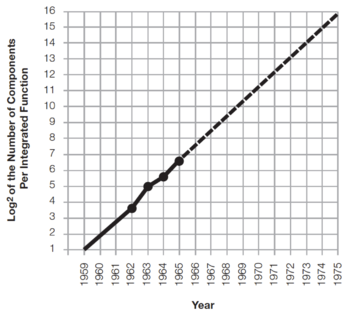Difference between revisions of "CoE 197U Scaling"
| Line 10: | Line 10: | ||
== Evolution of Complexity == | == Evolution of Complexity == | ||
| + | As Gordon Moore predicted, the cost and performance advantage of putting more and more devices into a single integrated circuit (IC) led to the rapid increase in circuit complexity. One convenient indicator of circuit complexity is the number of transistors contained in a single IC. | ||
=== Transistor Count === | === Transistor Count === | ||
Revision as of 09:32, 26 February 2021
Contents
Moore's Law
In 1965, Gordon Moore published a 4-page paper entitled "Cramming more components onto integrated circuits"[1], where he predicted that the number of components in an integrated circuit will increase by a factor of two every year, as shown in Fig. 1. Note that he based his extrapolation on just 4 data points!
 Figure 1: Gordon Moore's 1965 prediction[1]. |
Why is this paper and the graph in Fig. 1 important? Gordon Moore's prediction, also known as Moore's Law, has reflected and, more importantly, driven the steady and rapid progress in computing technology[2].
Evolution of Complexity
As Gordon Moore predicted, the cost and performance advantage of putting more and more devices into a single integrated circuit (IC) led to the rapid increase in circuit complexity. One convenient indicator of circuit complexity is the number of transistors contained in a single IC.
Transistor Count
Frequency
Power Dissipation
Challenges in Digital Design
Why Scale?
The Cost of Integrated Circuits
Non-Recurrent Engineering Costs
Recurrent Costs
Yield
References
- ↑ 1.0 1.1 Gordon E Moore, Cramming more components onto integrated circuits, Electronics, Volume 38, Number 8, April 19, 1965 (pdf)
- ↑ Gordon Moore: The Man Whose Name Means Progress, IEEE Spectrum, March 2015.